2019 Toyota Yaris Service, Tires & Repairs
Get Started
Complete Auto Care for Your 2019 Toyota Yaris
-
TIRES FOR YOUR 2019 Toyota Yaris View Tire Info GET TIRE PRICING
-
REPAIR FOR YOUR 2019 Toyota Yaris View Repair Info SCHEDULE REPAIR
-
MAINTENANCE FOR YOUR 2019 Toyota Yaris View Maintenance Info SCHEDULE MAINTENANCE
-
OFFERS FOR YOUR 2019 Toyota Yaris Limited Time Tire Offers VIEW ALL COUPONS
2019 Toyota Yaris Tires
Recommended Tires | Tire Information
2019 Toyota Yaris Tires Sizes, Speed Ratings, and Inflation
Not sure about your 2019 Toyota Yaris tire size? Use the following chart to find information on tire size, speed rating, and inflation.
| Trim Level | Speed Rating | Inflation in PSI F/R | Tire Size |
|---|---|---|---|
| 2019 Toyota Yaris XLE | H | 36 PSI/33 PSI | P185/60R16 |
| 2019 Toyota Yaris L | H | 37 PSI/33 PSI | P185/65R15 |
| 2019 Toyota Yaris LE | H | 36 PSI/33 PSI | P185/60R16 |
|
2019 Toyota Yaris XLE Speed Rating: H Inflation F/R: 36 PSI/33 PSI |
|
2019 Toyota Yaris L Speed Rating: H Inflation F/R: 37 PSI/33 PSI |
|
2019 Toyota Yaris LE Speed Rating: H Inflation F/R: 36 PSI/33 PSI |
* Note: these models have different tire sizes depending on vehicle options.
Recommended Tires for Your 2019 Toyota Yaris
What tires are best for a 2019 Toyota Yaris? Check out the following tire brands and types.
 Blizzak WS90
Blizzak WS90
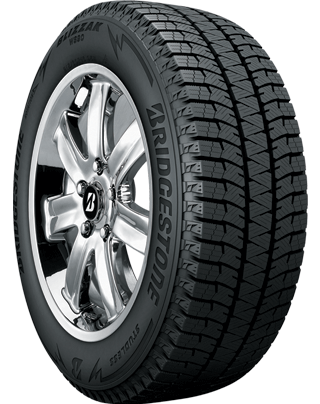
- No warranty
- Winter
- Winter
 Ecopia EP422
Ecopia EP422
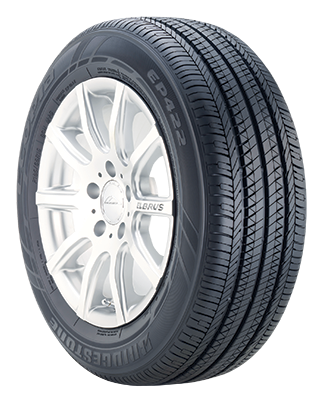
- Platinum Pact Limited Warranty
- All-Season
- Performance
 Ecopia EP422 Plus
Ecopia EP422 Plus
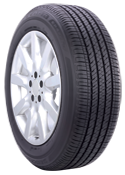
- Platinum Pact Limited Warranty
- All-Season
- Performance
 WEATHERPEAK
WEATHERPEAK
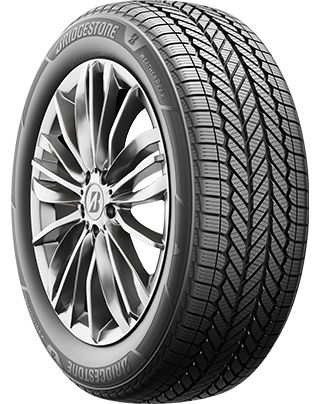
- Platinum Pact Limited Warranty
- All-Season
- Passenger Tires
 ALL SEASON
ALL SEASON

- No warranty
- All-Season
- Passenger Tires
 WEATHERGRIP
WEATHERGRIP
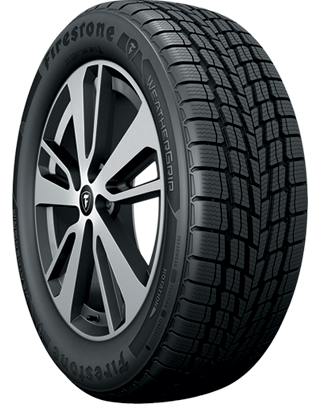
- No warranty
- All-Season
- Passenger Tires
 Winterforce 2
Winterforce 2
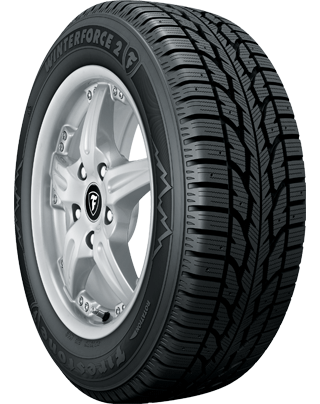
- No warranty
- Winter
- Winter

- No warranty
- All-Season
- Passenger Tires

- No warranty
- All-Season
- Passenger Tires
 Extensa A/S II
Extensa A/S II

- No warranty
- All-Season
- Passenger Tires
About 2019 Toyota Yaris Tires
Beyond the correct tire size, you also want to consider a handful of other factors when buying new Toyota Yaris tires like which tire brands you like most and where you drive. When thinking about your driving conditions, consider where you live (mountains vs. city vs. countryside) and the kind of weather can catch you off-guard. (Watch out Tornado Alley!) Drivers in states that fully experience all four seasons often buy two sets of tires: one for winter and one for summer. Other drivers prefer to purchase one all-season set to limit trips to the tire shop and make sure their vehicle is prepared in the rain, sleet, snow, or sun!
Driving style is next on the list to think about when buying tires. If you're a diehard off-roader, you have very different tire needs than a highway commuter who doesn't leave the paved path. Talk to a tire technician at Firestone Complete Auto Care for help choosing the best tire for you, or start shopping for Toyota Yaris tires online.
2019 Toyota Yaris Tire Installation & Rotation
Firestone Complete Auto Care installs more tires on more cars than most other companies. We're your tire shop and a complete service center for tire installation, maintenance, repair, rotation, and alignment! Shop 2019 Toyota Yaris tires online and schedule an installation appointment.
Questions About 2019 Toyota Yaris Tires
-
Is Toyota tire inflation important? The right tire pressure can make all the difference. Proper tire inflation helps increase fuel economy, improve braking time, and boost tire lifespan! Even a small change in tire pressure can impact your driving.
-
Why are there numbers on the side of my Toyota Yaris tires? The numbers on your tire sidewall give you information about tire speed rating, traction, treadwear, tire size, and load carrying capacity. Chat with a tire technician to learn how to read the numbers on your Toyota tires!
-
How do I check the tread depth on my Toyota tires? Stay on top of your tire tread depth to help avoid a dangerous drive. You can check tread depth with a penny. Hold the penny so that Abraham Lincoln is facing you, then place your penny into a tread groove upside down. If you can see the top of Abe’s head, your tread is shallow and it might be time for new Toyota Yaris tires. Grab a penny. Hold the so that Abe Lincon's head is facing you and his hair is pointing toward the ground. Then, place the penny into a tread groove. If you can see the top of Abe’s head, your tread is shallow and it might be time for new Toyota Yaris tires.
Repair Services for Your 2019 Toyota Yaris
How do I learn more about auto repairs? Click on a service below to read about the types of Toyota Yaris repairs we do at Firestone Complete Auto Care.
2019 Toyota Yaris Repair Information
Car repairs: for many drivers, that phrase is a dreadful one. But at Firestone Complete Auto Care, we strive to give you the excellent repair experience you deserve. When you come to us for 2019 Toyota Yaris repair services, our skilled repair technicians will get your Yaris back on the road. Before we begin any repair work, we’ll diagnose any issues and answer your questions about potential repair options. If a repair isn't necessary, we won't recommend it.
How Much Are Toyota Yaris Repairs?
The cost to repair your 2019 Toyota Yaris depends on which repairs are needed, costs of replacement parts or repair supplies, how much labor the repair will take, and where you live. We update them regularly to keep our deals fresh!
A few different aspects can influence repair costs for your 2019 Toyota Yaris, like
2019 Toyota Yaris Auto Repair Questions
-
Can scheduled maintenance help me avoid repairs? The cheapest 2019 Toyota Yaris repair is the one that isn’t necessary in the first place! Staying up-to-date with your car’s scheduled maintenance services is a great way to keep future repair costs low.
-
What does it mean to be 'in tune' with your car? No, we’re not talking about finding the best jams on the radio! You know your car best, and you’re the first person who will notice if something doesn’t feel right (like new smells, sights, or sounds coming from your car). If you sense that something is 'off,' stop in for a Courtesy Check to have these symptoms checked out ASAP. Early action could help you prevent Toyota Yaris repairs.
-
Why do you recommend certain repairs for my Toyota? We won’t recommend a service or repair for your 2019 Toyota Yaris unless we think it’s necessary to keep you safe. Want to know more about a specific recommended repair? Ask! We’re here to help.
Get Your 2019 Toyota Yaris Brakes Fixed
Your Toyota Yaris may be powered by a strong engine. But if you can't stop it, then it's scrap metal. If you’re experiencing squeaky brakes or a loss of braking power, don’t wait! Unresponsive brakes make it tough to give the road your best. Plus, waiting can lead to more expensive parts wearing out and requiring replacement. Go to your local Firestone Complete Auto Care for 2019 Toyota Yaris brake repairs. We offer a variety of brake services like brake pad/shoe replacement, brake rotor/drum refinishing, brake fluid exchange, and wheel cylinder and brake caliper installation.
Toyota Yaris Brakes Questions
-
What can cause my Yaris to shake when I apply the brakes? Feeling shaking or vibrating in your Yaris as you brake might indicate a few different problems, including worn brake pads or rotors, loose suspension components, damaged brake calipers, or warped rotors. Book an appointment for a free brake inspection as soon as you notice a problem with your brakes.
-
How long can I expect my Yaris brake pads to last? In general, brake pads can last from 30,000 to 40,000 miles. Certain factors, like driving on highways mostly and braking smoothly, can help your brake pads last longer. Hauling heavy loads and riding your brakes can shorten brake pad lifespan.
-
Does brake fluid leak when the car is off? Your Yaris brake system is a closed hydraulic system, so a brake fluid leak likely means you have an issue in your brake system. Over time, brake components can wear out or get damaged, causing a brake fluid leak.
Repairing Your Toyota Yaris Drivetrain
Drivetrains for front, rear, and all-wheel-drive and 4WD vehicles are not all the same. You don't want to go to any random shop for drivetrain repair. You want to come see the technicians at Firestone Complete Auto Care. We can take care of most 2019 Toyota Yaris drivetrain components Your Toyota could be crying out for driveshaft repair if you notice vibration as your vehicle accelerates, clunks when shifting, heavy vibrations in your floorboards, or resistance when turning.
2019 Toyota Yaris Drivetrain Q&A
-
What are the symptoms of a damaged Toyota drivetrain system? Hear noises toward the back of your Toyota Yaris? See fluid leaking? Having issues turning? These could all be signs of drivetrain damage you don't want to ignore. Take action quickly to catch repairs or replacements before something more severe happens.
-
Why is the malfunction indicator light (MIL) on in my Yaris? If your Yaris has its malfunction warning light (more commonly called the check engine light) illuminated, it could indicate engine troubles, problems with the transmission, electrical issues, malfunctioning sensors, connector problems, or misfire issues.
-
How worried should I be about a drivetrain malfunction in my Yaris? Don't ignore a drivetrain malfunction in your Yaris. As soon as you notice a problem, have it checked by a professional mechanic to diagnose the issue and carry out any necessary repairs. Driving with a faulty drivetrain is risky and may further damage your Yaris.
2019 Toyota Yaris Wheel Alignment
Alignment services involve precise adjustments to your Toyota Yaris’s suspension system, which serves to attach your wheels to your vehicle. In an alignment service, the individual angles of your tires are adjusted so that they come into contact with the road in just the right way — the way Toyota intended them to. Bring your 2019 Toyota Yaris in for a wheel alignment and we'll start with an alignment check. If needed, we'll adjust your wheel alignment angles to match Toyota recommendations.
Questions About Toyota Yaris Alignment
-
Are there road conditions that can hurt my Toyota Yaris alignment? Hitting a pothole or curb can alter your wheel alignment. So can general wear and tear over time.
-
How often does your Yaris need a wheel alignment? Check your Yaris owner's manual for Toyota's recommended interval. It's generally a good idea to check your alignment every 6,000 miles or 6 months, depending on which comes first.
-
Do you need to get your Yaris wheels aligned when you get new tires? It’s not mandatory to get an alignment after installing new tires on your Yaris, but it can be a smart decision! Proper alignment from the jump can help improve handling, fuel efficiency, and tire wear.
2019 Toyota Yaris Engine Services
If your 2019 Toyota Yaris needs engine repair, our expert techs will let you know what needs to be done and why before they get started. We never do any work without your sign-off. If a service can wait, we’ll make sure you know. If it's necessary for your safety, we'll make sure you understand that, too. We want to give you all the details you need to make an informed decision about your engine repairs. Choose Firestone Complete Auto Care for Toyota Yaris engine repairs and you can feel good knowing that we only use Toyota-compliant replacement parts such as the timing chain or belt, motor oil seal, fuses, or other parts.
Engine Q&A 2019 Toyota Yaris
-
Why does the check engine light come on when I start my Yaris? Generally, your check engine light turning on upon ignition is not a bad thing. It’s just your Yaris firing up its circuits. The light should turn off in a bit, but come see us if it doesn't.
-
Why does my Toyota engine sound different? Unusual noises can signal a problem with your Toyota Yaris engine. Tapping or knocking could mean you're low on oil. Whistling could mean a belt is misaligned or there's an intake leak. Squealing can indicate a loose fan belt, and grinding might be coming from the brakes, not the engine.
-
What could damage my Toyota Yaris engine? Some driving habits are not so great for your engine. These include driving on a near-empty gas tank, flooring the gas pedal while the car is in Park, or accelerating too quickly, too soon. Protect your engine’s performance and efficiency by distancing yourself from these habits.
2019 Toyota Yaris Tire Repair
If your 2019 Toyota Yaris is in need of a tire inspection or possible flat tire repair, Firestone Complete Auto Care has your back. Our tire technicians can determine whether it's safe to plug and patch the tire, or whether it needs to be replaced. To start, we’ll consider the location of tire damage, the type of issue, the size and scope of the damage, and the amount of wear on your tires.
If we determine that your 2019 Toyota Yaris tire can be safely repaired, we'll follow three basic steps to repair it: (1) Remove the tire from the wheel for inspection and repair, (2) fill the puncture to keep the moisture out, and (3) re-seal the inside lining of your tire so that air won’t escape.
Your Questions About Toyota Yaris Tire Repair, Answered
-
Can I drive my Toyota on a flat tire? Driving on a flat or underinflated tire can put extra stress on your wheels and alignment. While it’s sometimes necessary to drive a short distance on a flat tire to get to a safe place, don’t take any other trips in your Yaris until you can have the flat tire repaired or replaced.
-
Is temporary sealant bad for my Toyota's tires? Fast fixes are a mixed blessing. They’ll help you get your Toyota Yaris to Firestone Complete Auto Care, but don’t count on them to keep you on the road for very long. Using a temporary sealant may also void a Bridgestone or Firestone tire warranty.
-
Why do my Yaris tires keep losing air? Tire punctures, damaged wheels, and leaking valve stems are possible reasons for your Yaris tires continuously losing air.
2019 Toyota Yaris Maintenance
You want your Toyota Yaris to last as long as possible. If you put in the effort to keep up with proper maintenance, you could hit 200,000 miles (or beyond!) in your Yaris.
2019 Toyota Yaris Maintenance Schedule
What is the manufacturer recommended maintenance schedule for a 2019 Toyota Yaris? Find maintenance info for your vehicle.
2019 Toyota Yaris Maintenance Information
There's no need to guess when it's time to get Yaris maintenance, and no need to wait until something goes wrong. It’s as easy as following the recommended maintenance schedule that’s been written specifically for your 2019 Toyota Yaris! Toyota knows your vehicle inside and out (they made it, after all!), so they’ve designed this schedule with your car’s unique needs in mind. Driving conditions, climate variations, and other variables can affect which scheduled maintenance services you’ll need; however, recommended maintenance usually includes services like tire rotations, vital fluid checks/exchanges, filter changes, brake pad replacement, and oil changes. Scheduling routine service appointments is one of the best ways to help extend your Yaris's life, keep you safer on the road, and help you avoid expensive repairs caused by 2019 Toyota Yaris problems later.
Essential Maintenance to Keep Your 2019 Toyota Yaris Running Newer, Longer
Bring your 2019 Toyota Yaris to Firestone Complete Auto Care for factory-recommended maintenance services and our technicians will jump right in with a Courtesy Check. This Courtesy Check can establish a baseline of what may need to be addressed during your service appointment. Every Courtesy Check will include a visual inspection of your Yaris. We’ll check your head and tail lights, fluid levels, filters, tires (and their alignment!), and windshield wiper blades. We’ll also perform a free battery check to determine your battery’s charge level.
Firestone Complete Auto Care is your one-stop shop for 2019 Toyota Yaris maintenance and repairs. We can help you keep your vehicle (and your life!) running smoothly. Many of our locations have weekend and evening hours for your convenience.
2019 Toyota Yaris Maintenance Questions
-
What should I do after hitting a pothole in my Toyota Yaris? Watch out for pothole damage. If your 2019 Yaris is pulling to one side or the other, your tires or suspension system could be calling out for help.
-
When does my Toyota Yaris need high mileage oil? If your Toyota Yaris has ticked past 75,000 miles, consider switching to high mileage oil at your next oil change to give your engine what it needs to go another 75,000 (or more!). High mileage oil: make it a high priority!
-
Can I ignore dashboard lights on my Toyota? It's better to get them addressed as soon as possible. An illuminated dashboard light means something in your vehicle isn't functioning like it should. Letting problems linger can mean bad news for your Toyota Yaris, so be sure to take your car in for service as soon as you notice an illuminated dashboard light.
2019 Toyota Yaris Battery Replacement & Size
Researching battery replacements for your Toyota Yaris?
| Battery | Engine | Warranty | Cold Cranking Amps | |
|---|---|---|---|---|
| 47H5 | L4/1.5L | Replacement 36 months | Performance months | 650 |
| H5-AGM | L4/1.5L | Replacement 36 months | Performance months | 680 |
2019 Toyota Yaris Batteries
On average, auto batteries last anywhere from three to five years. Don’t get stranded by your Yaris’s car battery. Replace it regularly instead! Watch for signs that your current battery is getting too old or too weak. A slow engine crank, an illuminated check engine light or battery signal, bloated battery case, corrosion-covered posts, or weak lights may all indicate that your battery is waving goodbye.
Or, you can get a complimentary battery check at your nearest Firestone Complete Auto Care. Drop in for a free battery check and, if needed, get your Toyota Yaris a replacement battery. Automotive batteries are just one of our many areas of expertise. Our expert technicians understand Toyota service recommendations for Yaris battery cold cranking amps and reserve capacity. Get help identifying the type and size of battery that's best for your Yaris, and schedule an appointment today for a quick car battery replacement.
Commonly Asked Toyota Yaris Battery Questions
-
Why won’t my Toyota Yaris battery hold a charge? A battery is in its final hour when it will no longer hold a charge. The battery may be too old. Or, you may have been leaving your car doors ajar and the cabin light at night. Stop by for a complimentary battery check at your favorite Firestone Complete Auto Care and get a handle on your car battery’s health.
-
How long can I expect my car battery to last? The typical 12-volt car battery may last three to five years, depending on the type of battery, the driving conditions, and how well the battery is maintained.
-
Why is there white, flaky stuff around my Yaris’s battery post? A chemical reaction between battery acid and the air can cause a white, crusty buildup to form on the terminals of your Yaris car battery. This buildup — known as corrosion — can impede the flow of electricity and cause a range of issues, from poor performance to premature battery failure.
2019 Toyota Yaris Oil Changes
Your 2019 Yaris’s oil should be changed according to Toyota’s recommended oil change intervals. Outside of Toyota-recommended oil change intervals, your Yaris may need an oil change if your check engine light is on, you hear knock knock knock coming from the engine, smell oil inside the vehicle, or notice an unusual amount of exhaust. You may also need an oil change more frequently than Toyota recommends if you haul heavy loads, frequent dusty roads, enjoy off-roading, or go at low speeds on long distance trips.
Whether you need high mileage oil, synthetic oil, or conventional oil, you'll find the right 2019 Toyota Yaris motor oil at Firestone Complete Auto Care. Talk with a teammate and consult your owner's manual before picking a motor oil. At Firestone Complete Auto Care, you can choose from the following oils: Quaker State® Advanced Durability™ conventional oil, Pennzoil® High Mileage Vehicle® motor oil, Pennzoil Platinum® Full Synthetic motor oil with PurePlus™ Technology, and Shell Rotella® heavy-duty engine oil. During your oil change service, a technician will change your Yaris's oil, replace and recycle your used oil and oil filter, check all of your other filters, top-off important fluids, and visually inspect the rest of the vehicle. Make an appointment for an oil change service today and let the oil experts take care of your Yaris's engine.
2019 Toyota Yaris Oil Change Q&A
-
Why is my Toyota Yaris oil light illuminated? Your Toyota Yaris oil change reminder light may come on if you're overdue for an oil change. The oil pressure light will typically come on if the oil level in the engine is too low, the oil pump is failing, you have a clogged oil filter, or there's a faulty oil pressure sensor.
-
Can I change my Toyota Yaris oil at home? Changing your own oil isn't as convenient as you might think. It requires special tools and old oil must be disposed of properly. Having your oil professionally changed reduces the chances of something going wrong with the oil change, but also with your vehicle down the road.
-
Why is my Toyota Yaris exhaust smoke grayish or blue? You could have an oil leak and have a case of burning oil. Looks like it’s time for a professional to take a look. The leak could be the result of worn valve seals, fried piston rings, or old cylinder walls.
Engine Tune-Up Service for Your 2019 Toyota Yaris
Regular engine tune-ups can optimize your Yaris’s power on the road. The Firestone Complete Auto Care location in your community offers several Toyota Yaris engine tune-up services. The first is the standard Firestone Tune-Up. The standard Firestone Tune-Up includes new spark plugs (and installation!), a thorough inspection of engine components, and a lifetime parts warranty*. The second service focuses on your Yaris's filters, specifically replacing the air filter and fuel filter. Yet another service is a fuel system cleaning process, which involves removing varnish, dirt, and carbon deposits that have built up inside the fuel injectors, throttle body, and throttle plate in your Yaris. This goes a long way in boosting your fuel system’s overall performance. Here’s something to remember when choosing services: the mileage and service history of your Yaris can determine what kind of service it needs. Talk to a technician about your driving style, mileage, and service history to learn more about your vehicle's specific needs.
*Talk to a Firestone Complete Auto Care teammate for full terms and conditions on warranties.
Questions About 2019 Toyota Yaris Engine Tune-Ups
-
What happens if my Toyota Yaris spark plugs fail? Replace spark plugs on time or about every 30,000 miles or so. Without the spark of electricity created by spark plugs, your engine doesn’t have the combustion it needs to start — which could leave you stranded on the road. Always replace your spark plugs on time based on Toyota’s recommendations.
-
What do I do if I see a pool of liquid under my Toyota Yaris? Puddles could indicate that your vehicle is leaking coolant, oil, or brake fluid. Ignoring these leaks can lead to permanent engine damage, so address these symptoms ASAP with a tune-up service.
-
How frequently do the fuel injectors in my Toyota Yaris need to be cleaned? The frequency at which car fuel injectors should be cleaned can vary depending on several factors, including the type of fuel used and the driving conditions. Some manufacturers generally recommend a fuel system cleaning as part of your general car maintenance, or as needed based on symptoms of poor fuel system performance.
2019 Toyota Yaris Suspension Service & Repair
During the first few years you had your 2019 Toyota Yaris, you probably enjoyed a smooth and steady ride. But these days, things are starting to feel a bit rough. Perhaps your Yaris feels bouncy, pulls to one side, or makes a weird sound when you drive over a speed bump or turn. The first sign of trouble is the best time to bring your 2019 Toyota Yaris in for steering and suspension repairs. We’ll get to the source of your car problems and, if your Yaris suspension system needs repair, we'll explain all of your options and the potential cost.
Questions About 2019 Toyota Yaris Steering & Suspension
-
What can cause my Toyota Yaris to have a bouncy ride? Damaged struts or shocks can't dampen road bumps properly, causing your vehicle to feel like a trampoline after each dip or bump.
-
Why does my Yaris tilt forward when I hit the brakes? The forward dip in the front end of your Yaris when you brake is caused by the weight and momentum transferring to the front wheels. If your suspension system is in bad shape, it can fail to distribute this force, leading your front end to dip further downward.
-
Does tire pressure and tread depth impact my Toyota's suspension? Maintaining your tires can help reduce strain on the suspension, nd also let you know when it's time to replace your tires. A faltering steering and suspension system could lead to uneven tire wear.
A/C Service for Your 2019 Toyota Yaris
Our technicians will work to solve your 2019 Toyota Yaris A/C problems to the best of their ability. In this A/C performance inspection, we’ll check out the current condition of your 2019 Toyota Yaris A/C system to see if repair work is required. This check includes a visual inspection, performance test, and pressure and leak test.
When we perform an A/C repair on your 2019 Toyota Yaris, we’ll also do an A/C evacuation and recharge. To do this, one of our technicians will remove the refrigerant in your A/C system (if there is even any left to remove). Then, they’ll perform an evacuation (also known as a discharge) on the entire system per Toyota guidelines. The A/C system is recharged with new refrigerant.
2019 Toyota Yaris A/C System FAQs
-
Why do I get hot air from my Yaris A/C? Maybe your A/C starts cool but then gets warm. Or maybe it never gets cold in the first place. Either way, your A/C troubles could be traced back to a clogged expansion valve, faulty compressor clutch, blown fuse, or leak.
-
What can cause an A/C system leak? Over the years, the rubber seals and gaskets in your Yaris’s A/C system naturally degrade. Moisture can get into the system and cause a malfunction, or parts can simply wear out so that your system no longer seals properly.
-
Why does my Yaris’s A/C only work when the car is moving? If your A/C only works when the vehicle is moving, there could be a problem with part of your Yaris’s A/C or electrical system. Potential issues include low coolant or a faulty cooling fan.
Transmission Services for 2019 Toyota Yaris
The transmission delivers power from the motor to your wheels so that you can drive at your desired speed. Because of the transmission’s responsibility to translate the right dose of power into the right amount of speed, a tiny transmission issue can take a major toll on your car’s performance. 2019 Toyota Yaris transmission problems can show up as shifting delays, jumping or grinding during acceleration, the car shaking on the road, or whistling noises or a burning smell coming from beneath the hood. Let Toyota Yaris transmission problems linger and you might notice your fuel economy decrease or find that your Yaris isn’t working at all. Our expert techs are familiar with 2019 Yaris services and perform them according to Toyota-recommended specifications. Schedule an appointment at your local Firestone Complete Auto Care at the first sign of transmission problems to help diagnose, treat, and prevent major transmission issues.
2019 Toyota Yaris Transmission Questions & Answers
-
Does my Yaris's transmission fluid need to be inspected? Caring for your Toyota Yaris’s transmission fluid is a great way to help it perform. About every 30,000 to 60,000 miles is a good timeframe for having your transmission fluid inspected and perhaps changed. Service intervals can vary depending on how you use your Toyota, so check with your technician first. Luckily, leaks and low fluid levels are easy to spot and inexpensive to fix.
-
Can transmission fluid leak from my Toyota Yaris? Yes. Toyota Yaris transmission fluid can leak over time and potentially cause transmission issues. Worn or damaged seals, a loose or damaged transmission pan, a cracked transmission housing, faulty transmission cooler lines, or an overfilled transmission could cause transmission fluid leaks.
-
Should I avoid driving my Toyota Yaris if there is a transmission fluid leak? Driving with a transmission fluid leak is not recommended. Transmission fluid is essential to the proper operation of the transmission system, and a leak can cause serious problems, including reduced performance, overheating, and potentially transmission failure.
2019 Toyota Yaris Inspections
When you bring your vehicle to Firestone Complete Auto Care for any service, we’ll automatically do a multi-point Courtesy Check. To start, one of our technicians will check the battery in your Toyota Yaris to find out how much charge is remaining on it. We’ll follow the battery inspection with a visual check of your Toyota Yaris’s windshield wiper blades, lights, filters, hoses, alignment, tires, fluid levels, and belts.
While every visit to your local Firestone Complete Auto Care includes a Courtesy Check, you can also request a Complete Vehicle Inspection for your 2019 Toyota Yaris if you suspect there may be a bigger problem. A Complete Vehicle Inspection includes everything in a Courtesy Check, plus an examination (by hand!) of your steering, suspension, brakes, and exhaust system. This inspection is aimed at informing you of any major problems that could require preventative maintenance.
Depending on your location, your local Firestone Complete Auto Care may be able to perform state-mandated inspections or safety tests on your vehicle. Specific requirements for these types of inspections vary by state.
Common 2019 Toyota Yaris Vehicle Inspection Questions
-
How do I know if I should have an inspection on my Toyota Yaris? It needs a check-up if something feels 'off' to you, the driver. Your Toyota Yaris could benefit from a Courtesy Check if it has any illuminated dashboard lights, you hear weird noises coming from any part, the engine doesn't start sometimes, or your vehicle pulls to one side.
-
Can you fix my 2019 Toyota Yaris so it will pass a state inspection test? Don’t panic! Come in for a complete inspection today and we’ll find (and repair) the root cause before you have your vehicle retested.
-
When is the best time to get a complete vehicle inspection for my Toyota Yaris? The best time to get a complete vehicle inspection for your Toyota Yaris is before going on a road trip for the peace of mind. Another great time is when something abnormal occurs, and you can't pinpoint the issue. You might notice new dashboard lights, hear strange noises from under the hood, or your steering wheel doesn't feel like it once did.
2019 Toyota Yaris Radiator Repair & Service
Regular, proactive service on the radiator in your 2019 Toyota Yaris is essential for long-term engine health. Toyota recommends that you replace coolant (also called antifreeze) at certain intervals, but it’s also wise to keep an eye out for signs of a failing radiator. You could be on the verge of a radiator-induced engine breakdown if you see coolant leaks under your car, high engine temperatures, or a dashboard light that indicates low coolant.
If you bring your vehicle to Firestone Complete Auto Care, we start with a comprehensive inspection of your Toyota Yaris’s cooling system. We’ll do a machine-powered coolant exchange on the system, and then we’ll top off or replace the fluids that were removed (like chemicals, lubricants, and sealants). Lastly, we’ll perform a pressure check to look for leaks. From the heater core to the radiator cap, we’ll take excellent care of your 2019 Toyota Yaris at Firestone Complete Auto Care.
Questions About Toyota Yaris Radiators
-
What does an illuminated coolant temperature light mean for my Toyota? Pay attention to the temperature gauge and lights on your dashboard. If a low coolant warning light comes on or your dashboard temperature gauge keeps rising, it’s likely that your engine is about to overheat (and could leave you stranded on the road). Wait for the engine to cool down, then have your coolant system checked immediately at your nearest Firestone Complete Auto Care.
-
What is causing my Yaris to overheat? One of the main reasons your Toyota Yaris engine might overheat is because you don’t have enough coolant. Other causes include a clogged radiator, a damaged cooling fan, a malfunctioning thermostat, or a faulty water pump.
-
What is making my Yaris radiator sound like it’s boiling or rumbling? Your Yaris’s cooling system could contain air pockets or your radiator might be clogged. Another possibility is a faulty radiator cap, which is an easy fix!